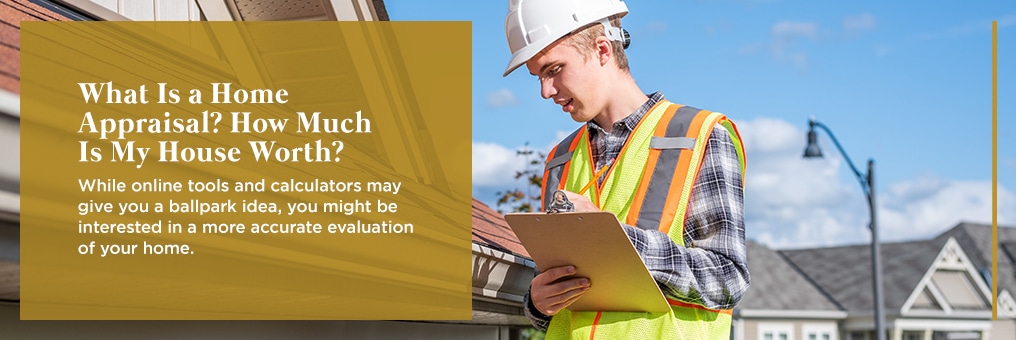Whether you’re ready to downsize, upgrade or change location, you need to know how much your home is worth to sell it for the best price. To discover an accurate home asking price, you might consider several different methods.
A home’s worth depends on many factors, including the selling prices for similar homes and the property’s condition, location and statistics about its neighborhood. However, how the agent or auctioneer runs the process also influences the price. Having a professional in the real estate industry represent you in this competitive market will help you get more money.
Before you consult a real estate professional to determine your home’s price, do a little research yourself! Once you have a basic understanding of your home’s potential worth, you’ll be able to take steps to improve value before selling. Keep in mind that assigning value to a home is a complicated mix of both science and art — your agent’s or auctioneer’s expert strategies will ensure you get the most out of your home.
Table of Contents
How to Price My Home: How Much Is My Home Worth?
Online valuation tools and calculators will help you determine your home’s worth before seeking expensive professional services. Try some of these methods, and get a feel for where you might be able to set your home asking price.
Use Online Home Valuation Tools
To start discovering your property’s value, you may want to use an online home valuation tool. These tools weigh tax records, user-submitted data and public records against local sales and listings. You can plug in your address and some other essential information to get a general idea of your home’s potential worth.
Remember, much more affects your home’s value than what public records show. These tools lack pieces of information a professional home appraiser will consider, such as stains on carpets, blemishes on walls, pest issues and renovation or improvement projects. It won’t consider room sizes, upgrades or additional design features that’ll impact value. The number provided by a home valuation tool helps you gauge value, but you should incorporate other methods with it to come up with an accurate listing price.
Look at Comparative Market Analysis
When determining home value, comparative market analysis (CMA) is a crucial factor. When you work with a local real estate agent, they provide you with a free report of the going price for similar properties in the immediate area that have been listed or sold within the past few months.
When you set an asking price for your home, you need to know how much houses like yours tend to sell for. If you aim too high above the CMA, buyers won’t bite. If you go too far below the CMA, you’ll lose money. Keep in mind that this analysis isn’t as accurate as a professional appraisal, but it’s a no-cost way to find out the value of your home.
Use the Federal Housing Finance Agency House Price Index Calculator
The Federal Housing Finance Agency provides a useful house price index calculator. Based on how much you paid for your home when you bought it, this tool calculates its current possible value based on appreciation. Of course, this factor isn’t the only one that matters. This tool can’t account for the state of the home, repairs or curb appeal.
Evaluate Comparable Properties
Besides receiving a CMA from your selling agent, it’s also helpful to research the price of similar recently sold properties on your own. In real estate lingo, a comparable property is a property with a similar size, number of bedrooms and bathrooms, condition and location to yours. Before you put your house on the market, you may want to browse through local listing sites to find nearby residences that appear similar to yours.
Since buyers and their representatives have access to this data, a buyer will seek to pull down an asking price that’s higher than the comparables. If you’re going to set an asking price much higher than the comparables, you’ll need a good reason. If you’ve done a lot of work on your home, for instance, you might be able to command a higher price. However, working with a real estate professional who understands comparable property value will help you determine a price that satisfies both you and the buyer.
Get a Home Appraisal
Your buyer will have to obtain a professional home evaluation for financing, but it may be a good idea to get a pre-appraisal before you put your house on the market to have somewhat of an objective option of its worth. However, appraisers, like real estate agents, don’t have a crystal ball and therefore rely partially on their gut feeling to determine your property’s appraised value.
It’s helpful to bring in two appraisal companies to receive two values for your property and get a more accurate listing price. A licensed third party will personally inspect your home and offer a professional opinion on its worth.

What Is a Home Appraisal? How Much Is My House Worth?
A professional home appraisal will help you get a more definitive estimate for a fair listing price. While online tools and calculators may give you a ballpark idea, you might be interested in a more accurate evaluation of your home. A local agent who knows the market and comparables in your local area will give you a better concept of what your house is worth.
Pros and Cons of Home Appraisal
It’s smart to seek a home appraisal if you feel your home’s value may be challenging to estimate accurately. For instance, if you’ve renovated or added on to your home and replaced appliance fixtures, it’ll be worth more than a simple appreciation calculator will be able to guess. Or, if the area lacks similar properties — for example, maybe you have more acreage than any homes nearby — you may have trouble coming up with comparable listing prices. A professional home appraisal is a good option in these cases.
Though it’ll help you set your asking price, an appraisal comes with downsides. For one thing, it’s expensive. You’re looking at spending several hundred dollars out of pocket for an in-person professional assessment. You’ll also want to prepare for the walk-through by upgrading fixtures, repairing any damages and landscaping for curb appeal. If your home is well-loved and lived-in, this method may pose a significant hassle.
Home Inspection vs. Appraisal
The terms “home inspection” and “home appraisal” might seem interchangeable, but they’re quite different. A home inspection is an evaluation of a home’s condition with recommendations for repair. A home inspector considers the property’s interior and exterior, from walls, floors and mechanical and electrical systems to roofing, siding, windows and doors.
On the other hand, a home appraiser determines a home’s worth based on factors including its amenities, age, lot size and other factors buyers care about. The appraiser also considers the local real estate market, including any comparables. The final report will usually not include recommendations for improving value.
Home Appraisal Process for Your House
The home appraisal process is multifaceted. First, the appraiser will examine your home, both outside and inside. They’ll take pictures and consider the condition of your home’s permanent fixtures, like carpeting, drywall and appliances. Even though an appraiser won’t reduce your home’s value if you have dirty dishes or unswept floors, it helps to clean up before your appraisal to eliminate any obstructions from an accurate analysis of your sinks’ and floors’ condition.
Afterward, the appraiser will evaluate your area’s current housing market to gather data on comparable homes. Once they’ve compiled all this information, they’ll present a report.
The appraiser’s analysis will include the home’s size and condition, the building’s structural soundness, notes on its renovations, information on comparable properties and photographs of the house. Having weighed all these factors, the appraiser makes an educated estimate of the price the house will command.
How to Increase Your Home’s Appraisal Value: Price of My House
Before you seek an appraisal, decide if you want to invest in any improvements or if you’d prefer to sell your property as-is. Generally speaking, the more improvements you make, the more you’ll be able to ask for from a buyer. But home renovation can be expensive and time-consuming, so you may choose to make little or no changes to your home before selling.
Here are some simple things you can do to improve your home’s appraisal value.
- Gather documents: You’ll want to compile any documents with information on your property’s size, how much you paid for it or verification of home improvements you’ve made over the years.
- Tidy up: Though an appraiser’s job is to consider your home’s permanent elements, a clean house will yield a better impression.
- Fix small issues: Inexpensive repairs will contribute little by little to your home’s overall value. Replace broken doorknobs or showerheads. Patch up cracked paint. Tighten leaky sinks.
- Do some light landscaping: Pulling weeds, clearing litter and planting a few flowers are quick fixes to improve your home’s first impression and curb appeal.
Contact Cates Auction & Realty Company for a Free Property Analysis
Figuring out your home’s value is a crucial step in the selling process. You want your asking price to be on par with comparable properties, so you’ll be able to get the best offers. With more than 75 years of experience in the real estate market, our team at Cates Auction & Realty will help you find the most accurate home value based on other listings in your local area.
Professional appraisals are expensive and require a lot of preparation. As a starting point, it’s best to use an online property analysis. Since your home is unique, you’ll want to use a valuation service that allows for open-ended information to provide you with a more accurate estimate. For a reliable online property valuation, use our free property analysis tool.


